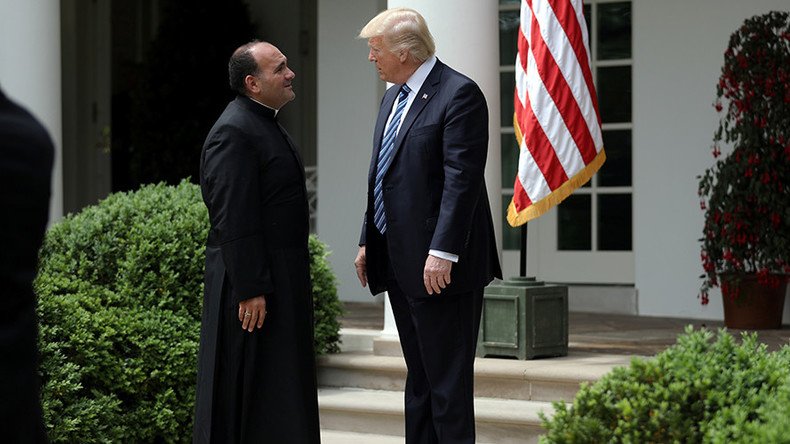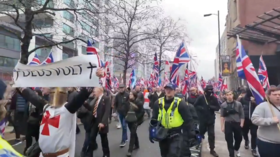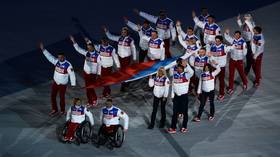Trump to visit Saudi Arabia, Israel & Vatican in first overseas presidential trip

On the National Day of Prayer, President Donald Trump announced his first official trip abroad will be to three religious meccas: Saudi Arabia, Israel and Italy, where he will meet with Pope Francis.
“Tolerance is the cornerstone of peace. And that is why I am proud to make a major and historic announcement this morning,” Trump said during a signing ceremony for two religious-themed executive orders in the White House Rose Garden on Thursday morning.
The trip to Saudi Arabia, Israel and Rome, “a place my cardinals love very much,” Trump joked, will come ahead of a NATO summit in Brussels and a Group of Seven (G7) meeting in Sicily later this month.
#Trump: "My first foreign trip will be to #SaudiArabia, then #Israel, then a place my cardinals love very much - Rome" pic.twitter.com/2ccWzumXRs
— RT America (@RT_America) May 4, 2017
In Saudi Arabia, the president will meet with “leaders from all across the Muslim world.” During the gathering, “we will begin to construct a new foundation of cooperation and support with our Muslim allies to combat extremism, terrorism and violence, and to embrace a more just and hopeful future for young Muslims in their countries,” Trump said.
“Our task is not to dictate to others how to live but to build a coalition of friends and partners who share the goal of fighting terrorism and bringing safety, opportunity and stability to the war-ravaged Middle East,” he added.
The trip is at the invitation of King Salman bin Abdulaziz, the custodian of the Two Holy Mosques, the White House said. Along with a bilateral meeting, Trump will attend a Gulf Cooperation Council summit while in Saudi Arabia. The visit will be historic “by every measure,” Saudi Foreign Minister Adel al-Jubeir said in a statement.
The announcement comes as the Trump administration has resumed the sale of precision-guided munitions to Saudi Arabia, which was halted under the Obama administration due to human rights concerns over their use in Yemen. The administration is in the process of notifying Congress, the Saudi foreign minister said.
#Trump ‘true friend of Muslims,’ #Saudi prince says after meeting https://t.co/bZy2yGrZQrpic.twitter.com/EwHngX1zlb
— RT America (@RT_America) March 15, 2017
In Israel, Trump will meet with Israeli leaders President Reuven Rivlin and Prime Minister Benjamin Netanyahu, as well as Palestinian Authority President Mahmoud Abbas. They will “discuss a range of regional issues,” including “ways to advance a genuine and lasting peace between the Israelis and Palestinians,” the White House said in a statement.
The announcement comes one day after Trump and Abbas met for the first time at the White House. The leaders expressed optimism about rebooting peace talks between Israel and the Palestinian Authority, which would be facilitated by Trump. Although Abbas spoke several times about wanting a two-state solution, the US president did not mention the two-state idea specifically.
2-state solution 'gives impetus to peace process' & enables Palestine “to fight and deter terrorism" - #Abbashttps://t.co/wkl34vNlOb
— RT America (@RT_America) May 3, 2017
When Trump and Netanyahu met at the White House in mid-February, the US president told the Israeli prime minister that he would “like to see you hold off on settlements for a little bit.” When asked if he preferred a one-state or a two-state solution, Trump said, “I’m happy with the one they like the best,” referring to both Israelis and the Palestinians.
On Tuesday, Vice President Mike Pence told celebrators at a commemoration for Israeli Independence Day at the White House that “as we speak,” Trump “is giving serious consideration to moving the American embassy in Tel Aviv to Jerusalem.” Such a move would characterize a major change in American foreign policy, one that could strain relations between the US and the Palestinian Authority.
In Italy, Trump will travel to the Vatican City where he will have an audience with Pope Francis. They will “discuss cooperation between the United States and religious communities in areas of joint concern,” the White House said.
The pope was one of Trump’s most high-profile critics ‒ though rarely mentioning him by name ‒ during the presidential campaign, and has repeatedly warned against the rise of populism and nationalism around the world. Since Trump was inaugurated, the pontiff has slammed the “populist rhetoric” and “self-centeredness” of countries like the US toward asylum seekers, calling on nations to offer migrants “a dignified welcome.” Trump has vowed not to accept refugees.
Trump hasn’t tiptoed around criticizing the pope, either. As a candidate, he warned that Islamic State (IS, formerly ISIS/ISIL) viewed the Vatican as “the ultimate trophy,” and that “if and when the Vatican is attacked by ISIS… I can promise you that the Pope will have only wished and prayed that Donald Trump would have been president.”
At the end of April, the pope called on the US and North Korea to come to a peaceful solution for the rising tensions between the countries, which have “become too hot,” for the sake of humanity.
“We are talking about the future of humanity. Today, a widespread war would destroy – I would not say half of humanity – but a good part of humanity, and of culture, everything, everything,” Pope Francis said Saturday. “It would be terrible. I don't think that humanity today would be able to withstand it.”












